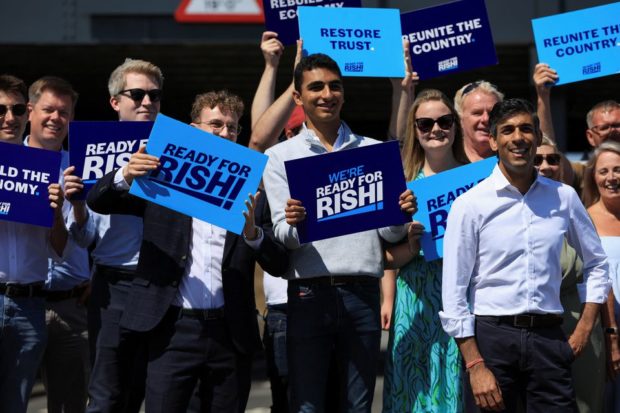
Former Chancellor of the Exchequer Rishi Sunak meets Conservative Party members and activists, in Teesport, Redcar, Britain, July 16, 2022. REUTERS
LONDON — The five Conservative contenders still vying to be Britain’s next prime minister will clash in a second televised debate on Sunday when they are set to renew hostilities over tax policy and issues such as transgender rights.
With no clear candidate to succeed Boris Johnson who is stepping down after a series of scandals, the battle to be the next leader remains unpredictable and increasingly fractious, exposing rifts in the ruling Conservative Party.
Ex-finance minister Rishi Sunak has emerged as the favorite among the 358 Conservative lawmakers, who will hold further votes this week to whittle down the field of contenders to a final two.
A JL Partners poll for the Sunday Telegraph suggested almost half of Conservative voters thought he would make a good prime minister ahead of his main rivals foreign minister Liz Truss and junior minister Penny Mordaunt.
However, Truss also has wide support, including from those most loyal to Johnson, and junior minister Penny Mordaunt has topped surveys of the 200,000 party members who will ultimately choose who becomes Conservative leader and therefore prime minister.
In a demonstration of how open the race is, a survey of party members for the Conservative Home website on Saturday suggested former equalities minister Kemi Badenoch was now ahead of the others, with Truss in second and Mordaunt, currently the bookmakers’ favorite, slipping to third.
British Foreign Secretary and Conservative leadership campaign candidate Liz Truss speaks during her campaign launch event, in London, Britain July 14, 2022. REUTERS
That came after the fifth candidate, Tom Tugendhat, chair of parliament’s Foreign Affairs Committee, topped a viewers’ poll after the first TV debate on Friday.
Whoever gets the job will take on rocketing inflation and low economic growth, as well as the public’s lack of confidence in politics after Johnson’s scandal-ridden time in power. Opinion polls also suggest the Conservatives are falling significantly behind the opposition Labour Party.
‘Fairy tale’
Friday’s first TV debate saw arguments over economic policy, with Sunak saying Truss’s proposed plans to axe increases in payroll tax and corporation tax at a cost of over 30 billion pounds ($36 billion) a year, were “a fairy tale”.
She retorted that her rival’s tax increases, proposed while Sunak was still in charge at the Treasury, undermined business investment at a time when the economy was struggling.
There were also sharp clashes over transgender issues and Johnson’s honesty.
“I’ve got enormous respect and admiration for all of my colleagues who are standing to be leader. And it’s right that we have passionate debate about these issues,” said Sunak, whose decision to quit the Treasury last week helped trigger a cascade of ministerial resignations that brought down Johnson.
British Conservative MP Tom Tugendhat speaks as he launches a campaign for party leadership in London, Britain, July 12, 2022. REUTERS
The snap poll after the debate showed viewers thought Tugendhat, who is unlikely to make the run-off, was viewed as the best performer, followed by Sunak, with Truss trailing in last place.
“Tom has only just started introducing himself to the country. Three days ago, he was basically unknown,” a spokesperson for Tugendhat’s campaign said. “People see him and they like him.”
Meanwhile Mordaunt, who like Tugendhat is a less well-known figure among the public at large, has attracted hostile attacks from rival camps over her experience and ability.
She says the “black ops” briefings are because the others know she is the most popular figure with party members.
However, initially it is their parliamentary colleagues they need to win over, and so their performances at the TV debates may prove particularly significant.
Conservative lawmakers will hold another on Monday when the candidate with the fewest votes will be eliminated, and the final two will be chosen by July 21. Party members will then vote for the winner who will be announced on Sept. 5.
RELATED STORIES
Who could take over as UK prime minister?
Why is Boris Johnson still prime minister?
UK PM quits as Conservative leader
Kremlin on Boris Johnson: we don’t like him either